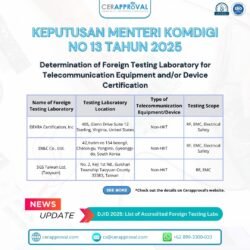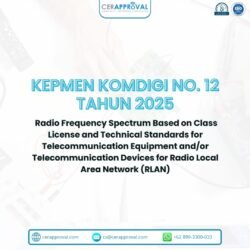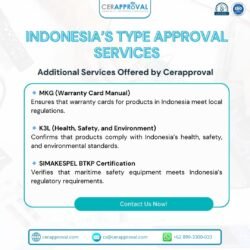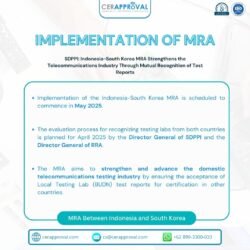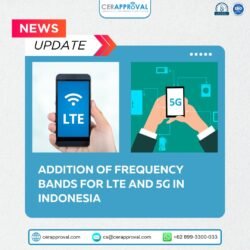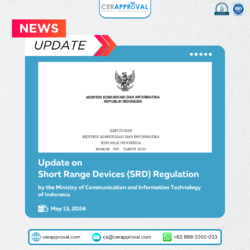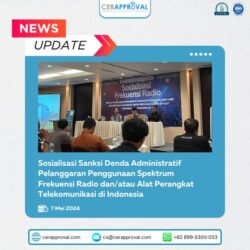Tag: #SDPPICertification
New RLAN Regulation: Keputusan Menteri Komunikasi dan Digital Nomor 12 Tahun 2025
The Ministry of Communication and Digital (KOMDIGI) of Indonesia has issued Ministerial Decree No. 12 of 2025, regulating the radio frequency spectrum based on class licenses and technical standards for Radio Local Area Network (RLAN) devices.
Get Indonesia Type Approval with Cerapproval – DJID / SDPPI, SNI, TKDN, K3L, MKG, & SIMAKESPEL Certification
Cerapproval provides Indonesia’s Type Approval services, including DJID / SDPPI Certification issued by the Ministry of Communication and Digital Affairs (KOMDIGI) and SNI Certification Type Approval by the Ministry of Industry (KEMENPERIN).
SDPPI and PPI Merged into the Directorate General of Digital Infrastructure
The Indonesian government has introduced a major restructuring, the Directorate of SDPPI and the Directorate PPI are now Merged into the Directorate General of Digital Infrastructure.
SDPPI: Indonesia-South Korea MRA Strengthens the Telecommunications Industry Through Mutual Recognition of Test Reports
The rapid digital transformation in Indonesia has led to the emergence of various telecommunications devices in the market. To simplify processes and advance the domestic telecommunications industry, the Ministry of Communication and Informatics (Kominfo), through the Directorate General of Resources and Equipment of Post and Informatics (Ditjen SDPPI), is collaborating with South Korea’s Ministry of Read more about SDPPI: Indonesia-South Korea MRA Strengthens the Telecommunications Industry Through Mutual Recognition of Test Reports[…]
Important Announcement: Expiration of Kepdirjen Number 109 of 2024 on the Designation of Foreign Testing Laboratories
The Ministry of Communication and Informatics (Kominfo) has announced that Kepdirjen Number 109 of 2024, regarding the Designation of Foreign Testing Laboratories for the Certification of Telecommunication Equipment and/or Devices, has officially expired as of December 31, 2024.
Update Your Company’s PIC Data in the SDPPI Postel Certification Account
The Directorate General of Resources and Equipment of Post and Informatics (SDPPI) once again reminds all companies to immediately update the Person-in-Charge (PIC) data in their respective certification accounts.
Addition of Bands for LTE and 5G in the New Regulation Kepmen Kominfo No. 352 of 2024
The Minister of Communication and Information Technology of the Republic of Indonesia, Budi Arie Setiadi, has enacted the Ministerial Decree No. 352 of 2024. This regulation governs the technical standards for telecommunications devices and/or mobile telecommunication devices based on Long Term Evolution (LTE) and International Mobile Telecommunications-2020 (5G) technology standards.
Update on Short Range Devices (SRD) Regulation
The Ministry of Communication and Information Technology of the Republic of Indonesia has issued Ministerial Decree No. 260 of 2024, which regulates the technical standards for Short Range Devices (SRD). This regulation replaces the previous Directorate General of Resources and Post and Informatics Equipment Regulation No. 161 of 2019, and introduces significant changes to the technical requirements for SRD devices in Indonesia.
Penalty Sanctions for Radio Frequency Spectrum Violation
This socialization discusses administrative penalty sanctions for the improper use of radio frequencies in Indonesia. There are several regulations that can serve as references for operators of telecommunication devices in carrying out their operations.

